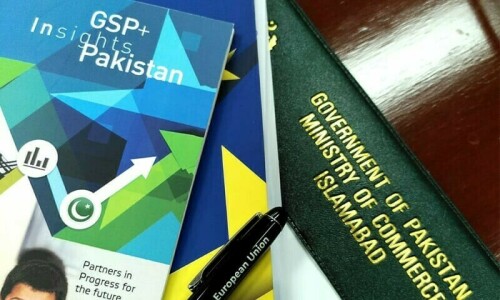Pakistan’s perfume industry has seen a significant rise in the past decade, specifically from 2017 to 2024, when several brands jumped on the fast fashion-to-fragrance bandwagon.
Beloved clothing brands — including Khaadi, Gul Ahmed, Bonanza, and Alkaram, to name a few — and even new market entrants — and such as activewear shoe brand One Degree (a mildly eye-raising entrance in the perfume relay) — are diving headfirst into the now-competitive perfume market, which has otherwise remained dominated by foreign brands and the wildly popular J. Perfume, after years spent establishing envy-inducing retail presence.
According to a study by Euromonitor, the industry is expected to see a steady year-on-year growth rate of 9.6 per cent from 2007 to 2026. Meanwhile, Statista projects the annual growth to be 2.7pc in 2024-2028. With little available data and next to no sales research in this area, it’s difficult to say conclusively exactly how on-the-mark these projections are.
However, according to Junaid ur Rehman, the Director of Operations at Scentcepts and former general manager of Gul Ahmed’s Fragrance and Beauty division until 2023, these figures are egregiously understated.
“Most sales here are undocumented, so it’s difficult to curate data. But, given the unofficial data and industry insights, the perfume industry should grow by around 16-18pc. If you talk about the retail industry as a whole, it is growing between approximately 18-22pc, so a 2.7pc growth rate doesn’t make sense.”
‘The domestic scents industry could be a Rs25-30bn market in the next 3-4 years’
Beyond that, most of these branded perfume lines are growing exponentially since they’ve only just launched in the past few years, adding to the overall industry growth rate.
“If you look at [Gul Ahmed’s] Ideas, it made Rs0.5 billion in perfume sales in its first year. This year their target is Rs2bn; if it meets that target, that’s almost a 300pc jump. J. doesn’t have this kind of drastic growth rate anymore, because it’s already established and found its market. Other brands are still enjoying their honeymoon period and growing exponentially,” Mr Rehman elaborates.
Now for a question and a meaningful segue: Why have brands decided to collectively march headfirst into perfumery, and how are they expecting to maintain their newly-earned status as coveted perfume brands in the face of newer, higher taxes and GST? As a luxury product, perfumes have long been slapped with a comparatively higher GST of around 20pc, which has now been upped to 25pc.
To start with, most, if not all, of these brands have relied largely on ready-to-wear clothing as their main product, so much so that the industry is saturated. Since a diverse product range and innovation are key in maintaining a fresh market presence — or in this case following J.’s footsteps — they set out to dip their toes into what used to be a fairly empty playing field.
To put a date on it, the dash towards perfumery started around 2018 when the government increased import duties on a number of luxury items in an attempt to reduce import volumes and curtail the country’s growing trade deficit.
Pre-import-duty-hike
In the years before import duties became unbearable, brands worked with foreign manufacturers (mostly in Dubai and China) to develop scents and produce a final packaged product that was imported into Pakistan.
These perfumes were made with foreign alcohol, since at the time Pakistani alcohol was considered a by-product from sugar and molasses production and was generally exported unfiltered since there was no local industry to feed high-quality, filtered alcohol. Pakistan also had a generous influx of high-brow foreign perfumes at a generally reasonable cost.
Post-import-duty-hike
Around 2018, the rosy days were close to an end: the rupee was depreciating at an alarming rate — it jumped from an average of Rs105.46 in 2017 to Rs121.82 in 2018 against the dollar, as per the World Bank — and the country’s reserves had suffered their sharpest drop in four years to $8.4bn in September 2018. Suddenly, the production status quo became too expensive for any sane company to continue.
The solution? Importing the perfumes in disassembled elements instead of a final, packaged product. As Mr Rehman explains, “The good thing about Pakistani brands is that they didn’t compromise on quality. Up until last year, the duty on a finished product was around 130-135pc. So, they started importing all the components separately, which had on average 30-40pc duty; comparatively more cost-effective.”
This opened avenues for local production companies in Pakistan, with outfits like Alpha Labs, Hemani, La Beaut, and Khwaja Arisols opening their doors to local brands. J. Perfume, has even recently opted to set up its own factory in 2023. Other companies, as they continue growing, may follow suit in the distant future.
Local alcohol production underwent a revolution. Sohail Siddiqui, the Senior General Manager of Operations at J. Perfume, explains, “Alcohol pre-2005 was wasted. There was no industry to make use of it, and only in later years did it occur to firms that they could try and export the alcohol. Now, with the local perfume production, Pakistani alcohol has found a significant use and is produced as a high-quality raw material for the industry.”
With greater attention, entrance of more market players, and more professionals catering to the overall growth of perfumery, the industry shows significant growth potential. According to Mr Rehman, “Only 30-40pc of the local market has currently been tapped, and it should be a 25-30bn market in the next 3-4 years.”
Pakistani customers
An oddity given the recently raised income tax and alarmingly high GST, something must be said about the Pakistani consumer. It would be a logical assumption that with higher energy prices, a less-than-desired exchange rate, a lack of government attention and subsidies, and now greater taxes would inevitably push brands to raise previously incredibly reasonable — dare I say almost shockingly low — prices which would deter the common consumer already weighed down by a fast-falling purchasing power. And yet, this isn’t the case.
“The Pakistani customer is strange,” Mr Siddiqui explains. “They aren’t keen on mass-market perfumes; in fact, people want to buy premium perfumes and are willing to spend accordingly. Compare this with India or Bangladesh, where people prefer mass-market perfumes and cosmetics. Exactly why many Pakistani brands have such exceptional premium perfumes; the consumer expects nothing less.”
An exporting future
When asked about Pakistani perfumes’ future export potential, Mr Siddiqui doubled down on our good fortune of being surrounded by several potential markets: “A big market we could tap into is Afghanistan, where people are willing to spend more for a premium product.
“Another potential market is Russia. Though they don’t spend as much on high-quality perfumes, they do buy mid-tier ones in a very large quantity. So we have the advantage of proximity, which we should avail.
“I’m not saying we should jump straight into competing with the European market; that would be very difficult, but we could start with the Russian market or Afghanistan or even the South African market, which is also a huge market for cheaper, mass-market perfumes.” When asked about government intervention, Mr Siddiqui expressed enthusiastic agreement, “Definitely. It’s a relatively new segment that has the potential to grow well and export, and we have a strong local market as well. So, the government should provide support to encourage production, as well as involve other industries since right now, largely only fashion companies are involved.”
Published in Dawn, The Business and Finance Weekly, July 1st, 2024













































Dear visitor, the comments section is undergoing an overhaul and will return soon.